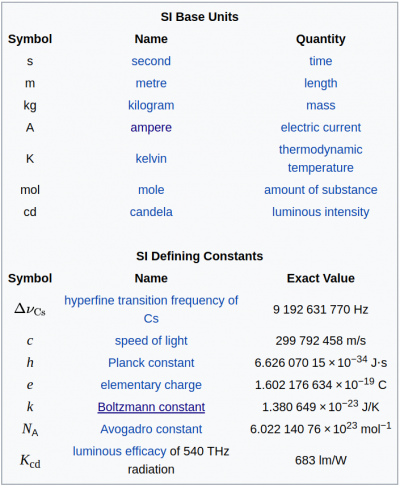International System of Units: Difference between revisions
Jump to navigation
Jump to search
No edit summary |
No edit summary |
||
| (7 intermediate revisions by the same user not shown) | |||
| Line 1: | Line 1: | ||
from https://en.wikipedia.org/wiki/International_System_of_Units: | from https://en.wikipedia.org/wiki/International_System_of_Units: | ||
[[File:SI.png]] | [[File:SI.png|400px]] | ||
Let's look at some more complex relationships, ones referring to electricity and magnetism: | |||
From https://en.wikipedia.org/wiki/Tesla_(unit), some practical relations: | |||
[[File:tesla.png|800px]] | |||
From https://en.wikipedia.org/wiki/Farad, we have: | |||
[[File:farad.png|800px]] | |||
and Coulomb [https://en.wikipedia.org/wiki/Coulomb] is a number of charges that flow in 1 second from a current of 1 Ampere. This number is on the order of 19. | |||
Another fundamental property is Boltzmann's constant [https://en.wikipedia.org/wiki/Boltzmann_constant], relating the energy of a gas to its temperature (among other more complex statistical physics properties). | |||
To understand the [[Electric Motor Generator]], one must understand the [[Lorentz Force]]. | |||
Latest revision as of 20:12, 10 May 2020
from https://en.wikipedia.org/wiki/International_System_of_Units:
Let's look at some more complex relationships, ones referring to electricity and magnetism:
From https://en.wikipedia.org/wiki/Tesla_(unit), some practical relations:
From https://en.wikipedia.org/wiki/Farad, we have:
and Coulomb [1] is a number of charges that flow in 1 second from a current of 1 Ampere. This number is on the order of 19.
Another fundamental property is Boltzmann's constant [2], relating the energy of a gas to its temperature (among other more complex statistical physics properties).
To understand the Electric Motor Generator, one must understand the Lorentz Force.


